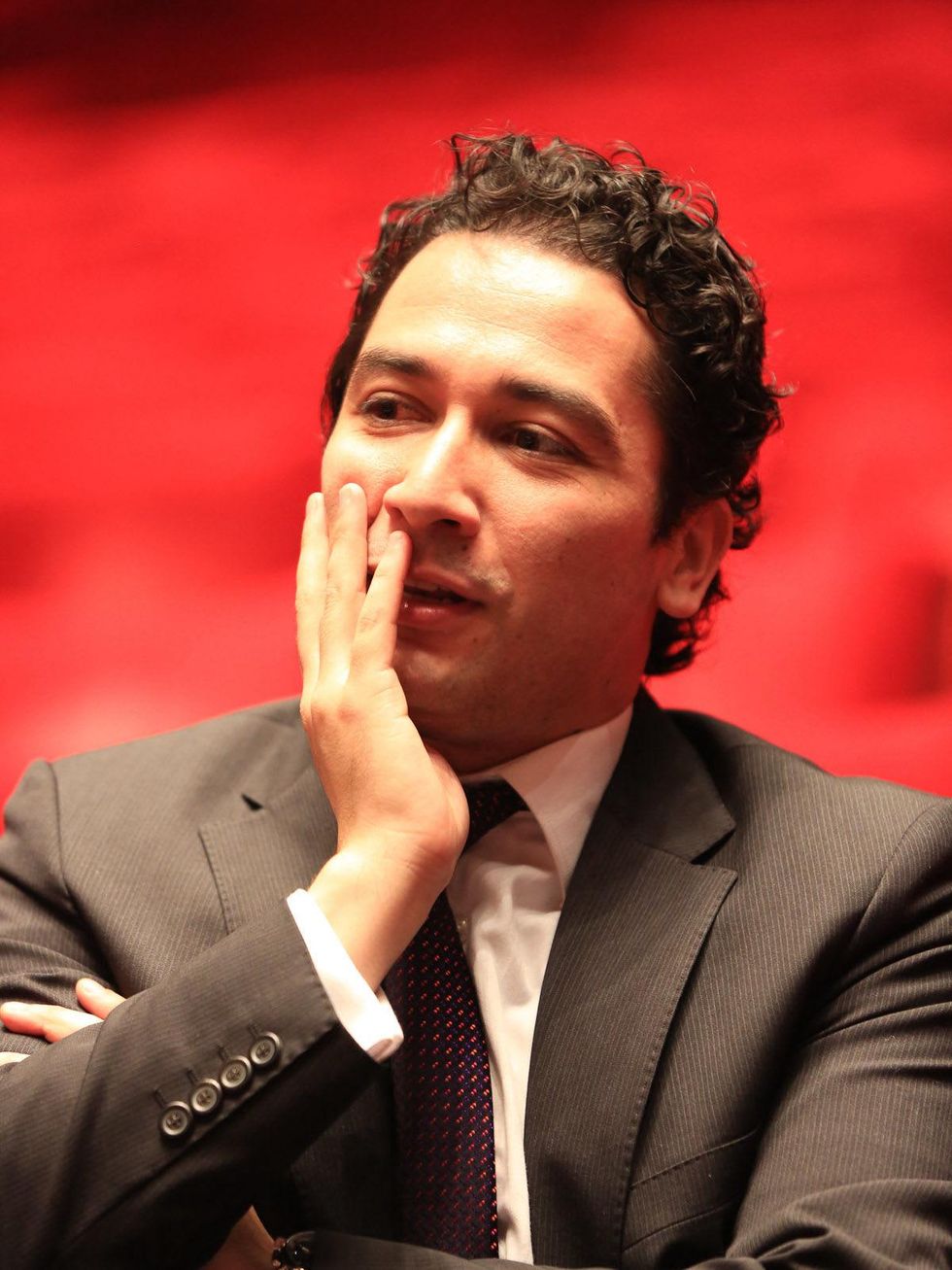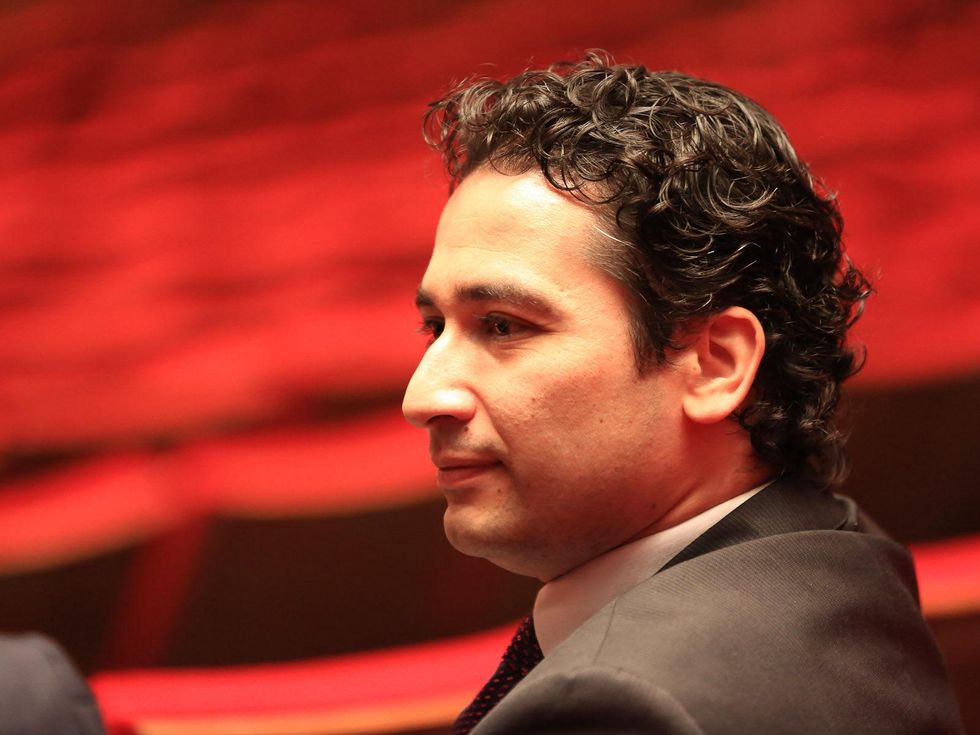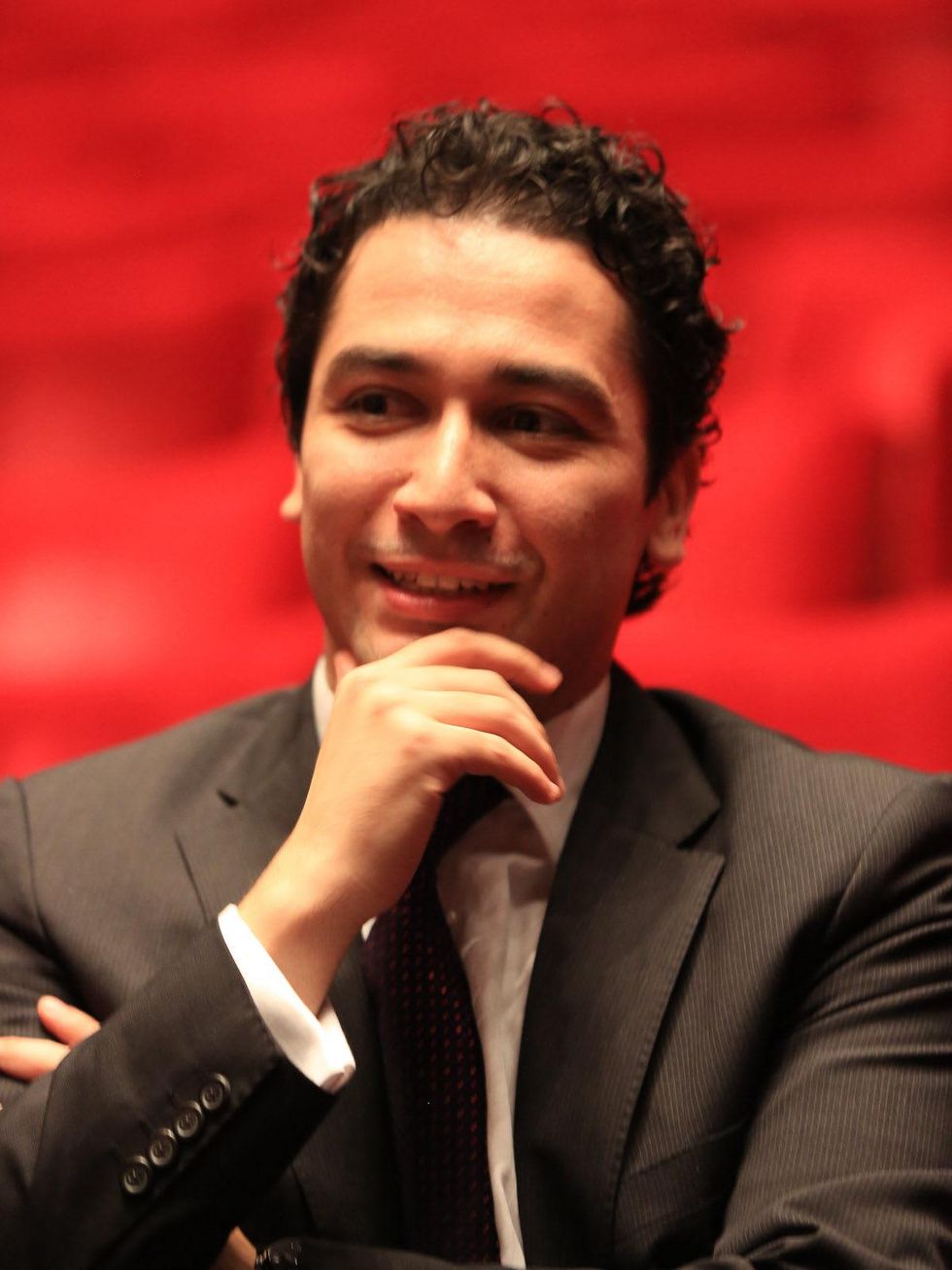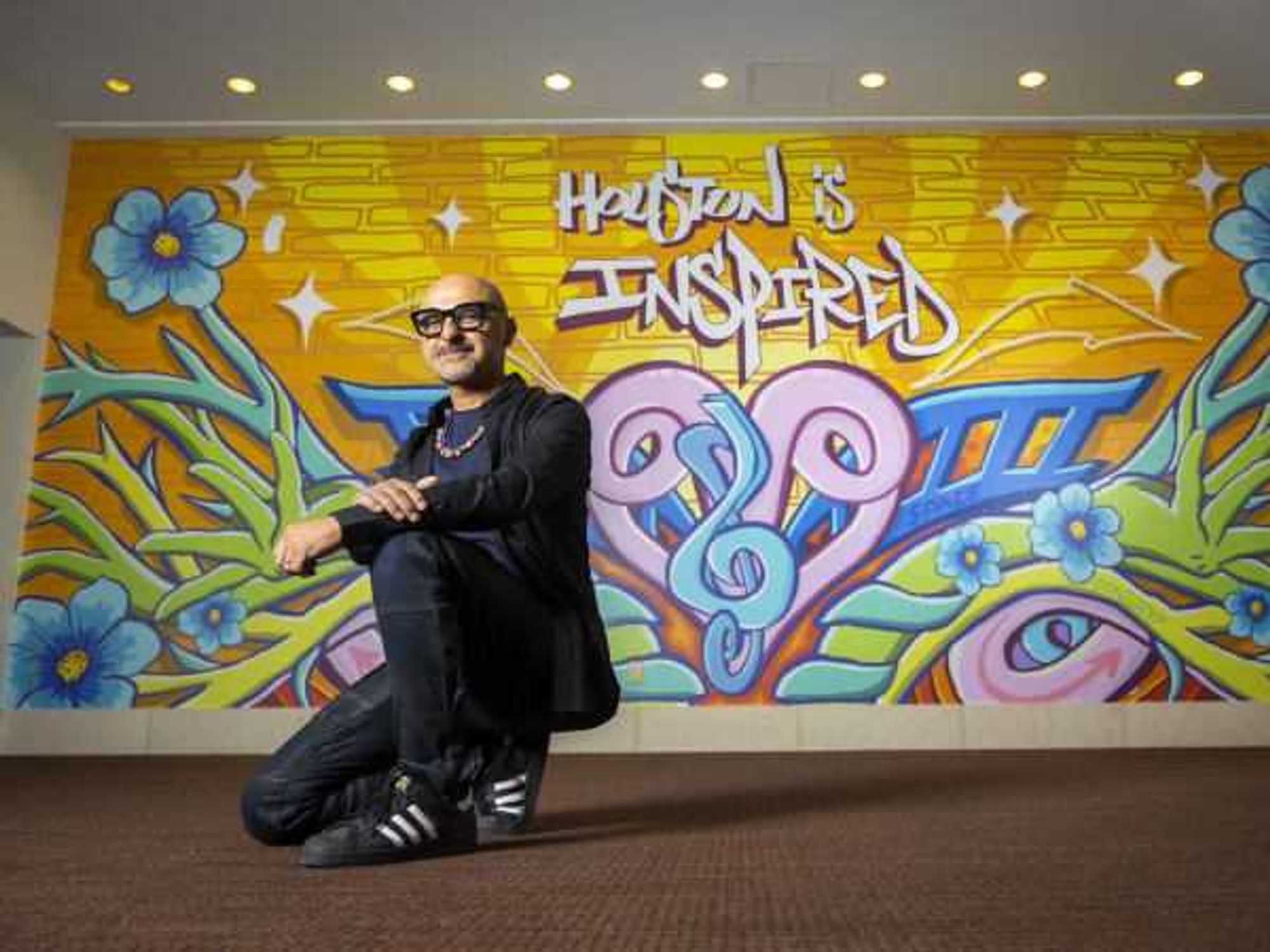CultureMap Exclusive
New Houston Symphony conductor reveals all: City misconceptions, burger love, Jim Parsons lessons & magic music
Andrés Orozco-Estrada couldn't stop pacing.
Hidden from view from a hundred or so guests on the stage of Jones Hall itching to learn why the Houston Symphony had summoned a last-minute press conference, something this group rarely does, the 35-year-old, Colombian-born conductor jiggled, moved, shuffled, did a happy-dance of sorts backstage waiting — craving — to reveal himself as the man who's set to hold this orchestra's top baton.
His energy just cannot be contained.
Orozco-Estrada was welcomed by Mayor Annise Parker, Symphony president and CEO Mark Hanson and board president Robert Peiser with open arms (read that CultureMap behind-the-scenes exclusive here). This positive, joyful reception imbued with Southern hospitality offered a glimpse inside Orozco-Estrada's prowess, charming personality, infections temperament and joie de vivre, the traits that had connected synergistically with the orchestra musicians instantaneously.
I had the opportunity to sit next to Orozco-Estrada for an exclusive tête-à-tête to get acquainted with the man behind the music, during which we chatted about his aspirations, his personal interests and his thoughts about the city's premier classical music ensemble. Amid talking about steak, chocolate, American sitcoms and Romanticism, I began understanding what drives Orozco-Estrada as an individual, as a father and as a musician.
CultureMap: I admit this may be an unfair question, but let's just run with it. What was your image of Houston before you came here in October, and how has your view of the city changed in the short amount of time that you've been here?
Andrés Orozco-Estrada: Before I came to Houston for the first time, I happened to be watching a lot of the sitcom The Big Bang Theory. The mother of Sheldon is from Texas — and I also know that the actor that plays Sheldon (Jim Parsons) is from Houston. Of course she's a stereotype, very exaggerated. But, oh, my goodness, I though this may be a very traditional city with lots of churches, very Catholic, where everyone goes to church.
I had an image of people wearing cowboy hats and boots everywhere, and people on the street spitting on the floor (laughs). I know, cliché. I thought as the city is close to Mexico, it must be filled with armadillos and Tex Mex. And hot weather.
Of course when I arrived in Houston, I found a city full of very interesting contrasts, very rich in every sense — not only rich in money — but also rich in culture, in opportunities, in languages. The second time I came here I had the opportunity to visit museums, parks and enjoy the city, and I was impressed by how much the city offered all its citizens. The best thing you can find here is opportunity.
"I hope after five years everyone in Houston will say, this was a conductor who let us feel the music as a totally alive experience."
CM: Did you get a chance to explore the city's food scene? Houstonians take a lot of pride in their restaurants and bars.
AOE: I ate steak every chance I had — I love a big steak. At lunch, at dinner, I ordered steaks at every hotel I stayed in.
I love hamburgers. I always argue with my mother because she says, "Don't eat too much hamburger, this is fast food." It's not fast, I say, it's fast because I eat them so fast. But think about it: A burger has everything in it, bread, salad, meat, what else would I want?
CM: Music directors leave a legacy. What would you want yours to be after your tenure with the Houston Symphony? What type of mark do you want to leave with the listeners and in the city?
AOE: I don't know if I can answer that question properly today, but I'll give it a try.
I want my legacy to be about the way we make music, the way we understand music and the way we approach music. That means that I give everything I have when I "do" music — and doing music also means speaking about music, dreaming about music and talking about music.
Specifically, when I am rehearsing or conducting a concert, I want people to remember me as someone who gave everything he had, all my thoughts, all my experience and all my energy. I think I lose one or two kilos every time I conduct.
"I always argue with my mother because she says, 'Don't eat too much hamburger, this is fast food.' It's not fast, I say, it's fast because I eat them so fast."
I hope after five years everyone in Houston will say, this was a conductor who let us feel the music as a totally alive experience.
This is the thing: You have to dare let music touch you to experience this. I want to create unforgettable moments. Every concert will have unforgettable moments.
CM: Maestro Hans Graf loves wine. How do you unwind outside of music? What are your interests outside of the arts?
AOE: I try to read when I can, and I spend time finding the right books. I love to read American and Colombian literature. Just two weeks ago I found a very interesting writer, Tomás González. Most of the time I am very busy thinking, getting inside my head to plan, study and prepare — and that's something I love.
"Mahler is a unique person, his music has a unique personality. His symphonies combine real life, the life after the life and the life before the life."
I love people. I love to speak with people and really hear them. That means small groups, intimate, exclusive conversations in the moment, when you can sit there and talk for two, three, four even five hours about life, music and everything in between. Unfortunately as a conductor, I don't have many opportunities to do that because of the busy schedule. So when I do — like right now — I enjoy that even more, so I take time to relish the moment.
I love chocolate.
I love to sleep and try to get as much sleep as I can. And before I go to sleep I must watch one or two episodes from one of my favorite American sitcoms. It relaxes me.
CM: Describe the ideal concert: How do you craft a program that speaks to you personally and to audiences?
AOE: I will give you two answers, both are true and come from inside my heart. This first one is more ideal, perhaps it may seem too romantic, but it isn't. It's true.
Every concert could be ideal if you make an intelligent combination of pieces and if you convince the musicians and the audience that the way we play is the best one. This is not to say other interpretations aren't good, but at this moment, at this time, this was the ultimate. This way, every concert could be ideal, perfect.
For my taste, what I love is Mahler symphonies. I love this very much. His music combines many things. Mahler is a unique person, his music has a unique personality. His symphonies — all his music, really — combine real life, the life after the life and the life before the life.
If you want to touch audiences, get very existential and pass across all realms, Mahler is one composer who helps you do that — if it's played well. If you cross this line, you access a different world, a world that's not here. It's somewhere else in the universe, a world you don't know or don't even know if it exists.
CM: We know from talking to the musicians and administration why the extended the offer of music director designate to you. But why did you accept it? You didn't have to — you are already holding two prestigious positions.
AOE: That's true, very true in fact.
The first and more natural answer is because I feel it was meant to be.
"This is an orchestra that's inspired — and wants to be inspired."
When the Houston Symphony first asked me, I needed one minute to think about the question. Not to think about the answer, but to understand that the question was a serious one. I said, of course, yes.
The first meeting with the orchestra was very natural. We had a strong connection. I had the feeling — all in one week — that the musicians were open to discovering a new way, our new way, to create music together, even if that meant repeating pieces performed before.
I feel that with this orchestra it's not going to be about "my version" but about "our version," like we did for Symphonie Fantastique. This is not always possible, and not every orchestra offers this opportunity. When it happens, it's just amazing.
That's why I am here. Because they can do this and play at a technically high level at the same time. This combination is key for me.
At the same time, the Houston Symphony is an orchestra that's absolutely financially secure. This is very important. Sadly we know that's not the situation in other professional American orchestras.
I have a feeling — a very strong feeling — as they say in German, that the musicians want to touch the stars. They are looking to touch all the stars. I want the same.
I want to be the best — not in a competitive way. The best means getting closer to everyone while making music.
If all this sounds very romantic, that's good. What would life be without being romantic? Without having dreams. Without inspiration?
This is an orchestra that's inspired — and wants to be inspired.
I had to say yes.



